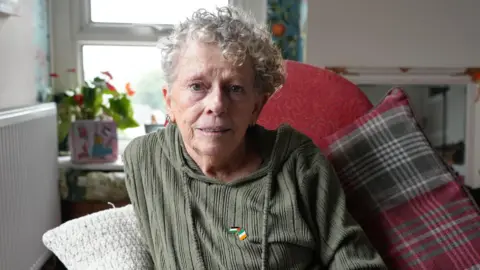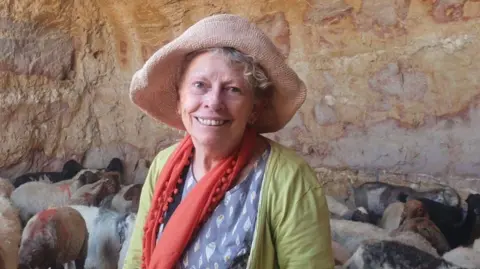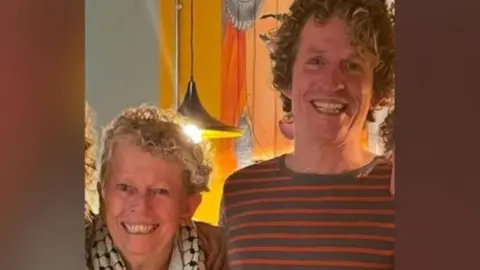Pro-Palestinian activist returns home after arrest
 BBC
BBCA pro-Palestinian activist has said she felt "outrage and heartbreak" after being detained in the occupied West Bank.
Dee Murphy, 70, who lives in Swansea, returned to Wales last week after being held in custody for up to 10 days.
Ms Murphy, originally from Cork, Ireland, who is now banned from returning to the area, said she had been volunteering with the International Solidarity Movement (ISM) as an observer at the time of her arrest.
The Israeli government has been asked to comment.
The West Bank is the land between the eastern edge of Israel and the western side of the River Jordan and is home to an estimated three million Palestinians.
Israel has occupied the West Bank - which Palestinians want as part of any future state - since the Six Day War of 1967, and is continuing to build settlements in the area.
These are regarded as illegal under international law, although Israel rejects this position.
While Israel has military control of the West Bank, the Oslo Accords of 1995 gave the Palestinian Authority some administrative and security control over certain areas.
Ms Murphy told BBC Wales she had been to the area multiple times over the past 20 years.
"I'm one of those people, injustice gets to me," she said.
"And, to me, what's happening in Palestine is one of the greatest injustices in the world today."
She added: "I came across the ISM and they were asking people to come as observers. Just being there I think shows Palestinians they're not alone."
She said she was volunteering in the southern area of the occupied West Bank, before Israeli settlers called the police on 31 May.
"[The area] has been particularly targeted by the Israelis. In this instance, a village that's very close to my heart called Khalet a-Daba had been demolished almost entirely a few weeks before I left. It was heartbreaking."
The IDF said the village was "built illegally within a military firing zone" and that Palestinians live there illegally.
Israeli far-right ministers in the coalition government have recently said that the approval of 22 new Jewish settlements in the occupied West Bank would "prevent the establishment of a Palestinian state that would endanger Israel".
Ms Murphy said "violent, despicable Israeli armed settlers came and forced two families out" of the village while she was there.
 International Solidarity Movement
International Solidarity Movement"They're untouchable, and they know it. And just to sit there and watch grown men and women, and grandparents sit there and take it, because if you raise a finger, against a settler, you're under arrest," she said.
"We stayed the night. And at about 05:45 in the morning I got up and I heard from the bathroom shouting, shouting, shouting, and glass being broken. The soldier had broken the glass of the door, shouting 'get out' and pointing guns at us."
Ms Murphy said she handed her passport and offered to leave the area, but she was told she would be detained until the police arrived.
"They told us there were three reasons - because we were in a closed military zone, that we refused to hand over our passports and that we refused to leave the area," she said.
"They do not want internationals there in Palestine, who will go home and talk to the media.
"[I felt] outrage, outrage combined with heartbreak, that I had to walk away from friends when they really needed us there.
"To be taken away from that, to be forced out, I was like, 'I'm not having that. I'm not signing that bit of paper, I'm going to fight it in the court'."
 Dale Ryan
Dale RyanMs Murphy said she was denied legal representation after initially declining the option of deportation.
Last week, her lawyer Noa Dagoni told the BBC that the handling of the case had been "deeply troubling".
"Things didn't work out for me," Ms Murphy added, "the communication was impossible.
"It didn't feel like it would have achieved anything. So I made the very sad decision to leave on my own accord."
She continued: "You know there's a risk.
"But if you're an optimistic person like I am, I'm like 'ah it's happened to other people, I'm going to be fine'. Not this time, sadly.
"But we'll do whatever we can here. I'll just have to redouble my efforts here, if I can't do it there, I'll do it here."
The Irish Embassy Department of Foreign Affairs and Trade previously said it was "aware of the case" and was "providing consular assistance".
The Foreign Office previously added that its staff "stand ready to support British Nationals overseas 24/7".
